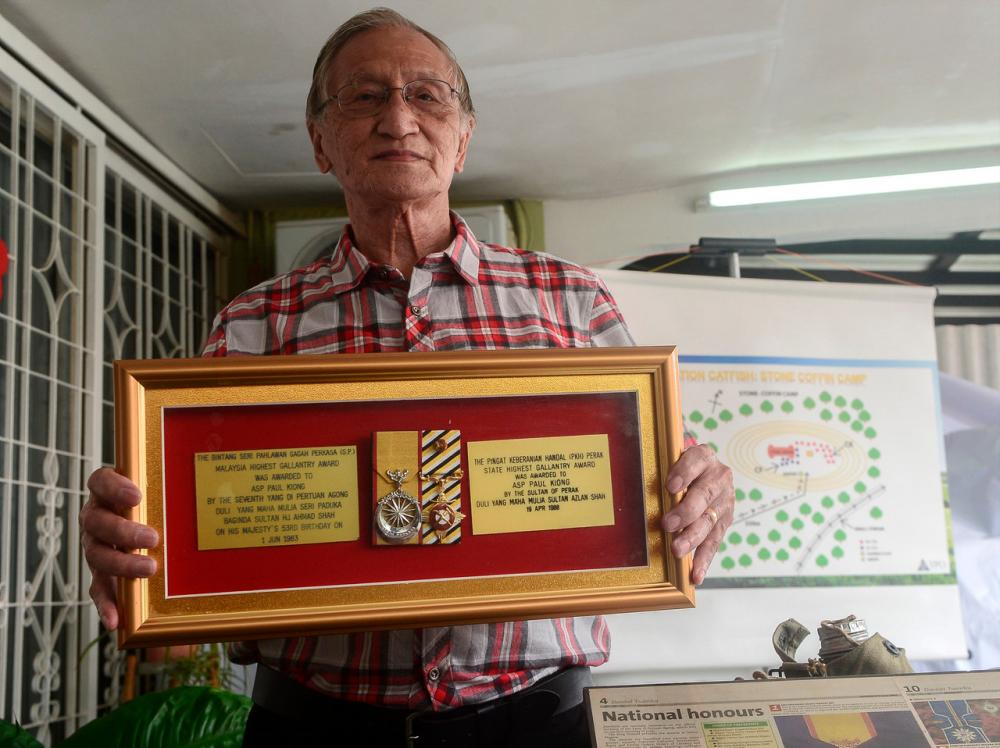KUALA LUMPUR: Failure of the Communist Party of Malaya to take over Malaya, leading to the fall of communism in 1989, is proof of the prowess of the country’s security forces in fighting the movement.
According to national heroes Datuk Paul Kiong and Captain (Rtd) Dr Wong Ah Peng, tactical and psychological approaches were among the methods used by the security forces, especially in eliminating the remaining communist insurgents in the country in the 70s and 80s.
Although they served in different security forces, Kiong, with the Royal Malaysia Police (PDRM) and Wong, with the Malaysian Armed Forces (ATM), their mission was the same, to defeat the communist to ensure peace in the country.
Kiong, 77, said his experience in intelligence work with the Special Branch of PDRM earned him the trust of his superiors to carry out undercover missions to obtain information on communist activities in the country.
The psychological assault approach allowed him to obtain as much information as possible to facilitate efforts to defeat the insurgents.
“If we use the approach of killing the enemy (communist), we will not get any information. So, following an order from my superiors, I went under cover as a food supplier to gain their (communist) trust.
“From then on, I went under cover and got to join the group and mingle with them (communist) for six years,“ he said in a special interview with Bernama, recently.
Paul, born in Ipoh, Perak, said the tactics were proven effective when 43 communist insurgents, including eight women, were arrested at a camp in Cameron Highlands, Pahang, in an operation known as Catfish: Stoke Coffin Camp in June 1981.
The communist insurgents were arrested without any bloodshed and no bullet was used, he said, adding that it was the biggest success during his 34 -year service with the police force.
It was a huge sacrifice because when Kiong went under cover, he rarely went home to see his family.
“When I had the chance to go home, my four-year-old child didn’t even know me,” he said.
He retired on Feb 1, 1988 and received many awards for his service and bravery in fighting the communist, including the Bintang Kehormat Seri Pahlawan Gagah Perkasa in 1983 and the Pingat Keberanian Handal Perak in 1988.
As for Wong, 65, who was with the Ninth Malaysian Infantry Brigade then, the tactical method was used to detect and attack a communist camp during a special operation in Gunung Korbu, Hulu Kinta Perak on June 1, 1979.
Together with 10 others, comprising the natives of Sabah and Sarawak and the Orang Asli, Dr Wong said they started the climb up the mountain at midnight with only the moonlight to lit their path to avoid being detected by the enemy.
“What we feared most was the booby traps,“ he said when met recently.
During the operation at the camp, which was at an altitude of five thousand feet above sea level, Dr Wong said his team was attacked.
Three communist insurgents were killed in the 3pm attack, said Wong, who suffered his first combat injury in the 45-minute firefight when a bomb exploded.
“It was a terrifying moment for our team, with the rains of bullets coming at us, but we finally managed to over power them, although we lost two men.
“The battle was intense as there were more than 30 of them (enemy),” said Wong, who retired from the service in 1986.
His advice for Malaysians is to together defend the country against any elements that could threaten peace and order so that everyone can continue to enjoy the independence achieved by the country.
-Bernama









